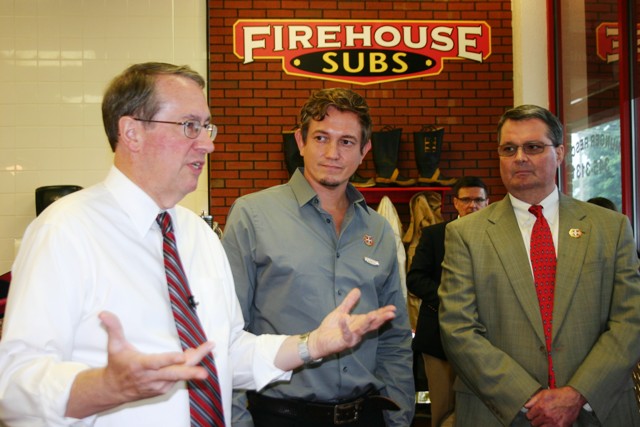
Congressman Bob Goodlatte stopped at Firehouse Subs at the Towers Mall last week to gain support for his bill to repeal the Renewable Fuel Standard, also known as the ethanol mandate.
The RFS mandates 36 billion gallons of renewable fuels to be part of the nation’s fuel supply by 2022, but Goodlatte says nearly all of this is being fulfilled by corn ethanol, which is driving up the price.
“When corn prices rise as high as they have in recent years, people who’ve been planting wheat stop planting wheat and start planting corn and then wheat prices go up because of supply of wheat is diminished as well.”
The increase is hurting a number of industries including environmental groups, hunger organizations, and restaurants.
Matt Riddleberger, the VP of supply Chain Services for Firehouse Subs confirmed Goodlattes remarks. “Just looking at this restaurant alone, when you compare prices from 2007 versus what they paid in 2012 for the products, just five items alone, our four bread items plus mayonnaise, it’s over $6,000 impact to the bottom line of the restaurant.”
He said the problem is that the standard mandates a certain number of bushels to be turned into ethanol, not a portion of the yield. “So when we have a bad year like we did last year and you pull five billion bushels of corn out of the system, you’re close to 40% of the total corn yield. And that’s a big impact on the prices of the commodities for the food products.”
Chris Pietrzyk – owner of the franchise, said that cost increase will ultimately be passed on to the consumer. “That impact is something that we incur over the course of a year as we’re buying the products on a weekly basis. So it’s something that we see in terms of our rising food costs and of course, our food costs is one of our largest percents of controllable [items] within our restaurant for profitability. So it’s something that we’re constantly managing. We try to take steps in house to improve our measures of handling food costs as well as improve our standards of staffing in order to control our costs. The last thing we want to do is take that difference and turn it on the consumer. But eventually, as the years go by, it continues to add up and it eventually does has to be pushed forward.”
Pietrzyk said his restaurant is eating the extra cost right now.
The Congressman said even the petroleum industry is concerned about the RFS, “because, quite frankly, we’ve made a lot of progress in the United States in reducing the amount of petroleum consumption and increasing the efficiency, the mileage of vehicles and so on. And therefore, this annual increase year after year after year of more ethanol isn’t being consumed in the industry and what they’re seeing is a push for higher percentages of fuel having ethanol in it and that has raised concerns from car manufacturers and others as well.”
Goodlatte’s bill, H. R. 1461, has 34 bipartisan cosponsors. Another piece of legislation he’s introduced would remove the requirement that corn ethanol be used. He feels this second one might have a better chance of getting through Congress.
– Beverly Amsler



Yes, consumers are paying more at the pump, but not because of Ethanol. A study by Louisiana State University estimated that on average, consumers saved six cents per gallon on gasoline for every billion gallons of ethanol produced. And, since the U.S. produced 13.8 billion gallons of ethanol in 2011, this means that U.S. drivers saved roughly 83 cents a gallon in 2011, totaling $111.22 billion in annual savings, because of ethanol! This is all the more reason to offer the consumer a choice and savings at the pump when they go to fill up.
While the congressman is entitled to his opinion, he is not entitled to make up his own facts. There is no substantial correlation between food prices and ethanol production. It is Big Oil that is costing the consumer both at the pump and at the grocery store. In fact, according to a recent World Bank study, the biggest driver by far of world food prices has been crude oil—responsible for almost 50 percent of the change in food prices since 2004.
In fact, only 14 percent of the price of food is attributable to the cost of the commodity, while the rest can be attributed to energy costs, marketing, salaries and profits. The processing, packaging, wrapping, storage, refrigeration and transportation costs are the true drivers in price increases. They are all energy intensive – it takes a lot to bring food from the farm to the table and food prices will follow with ever increasing oil and energy prices.
Too bad Goodlatte didn’t understand the terrible cost of government intervention in the market in 2005 and after when he enthusiastically supported the ethanal mandate as well as tax funded ethanol subsidies. At least he is on the right track on this issue today.